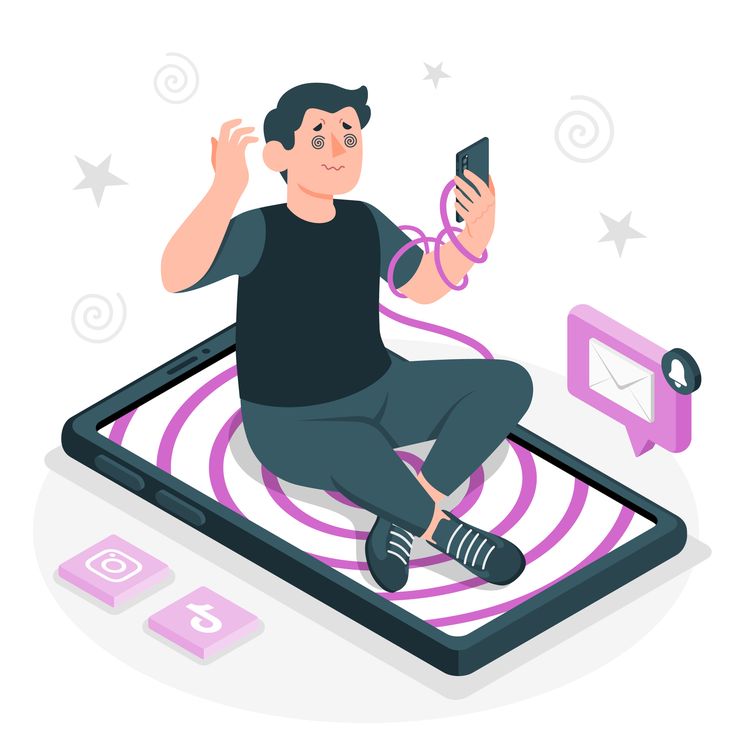ADHD and Internet Addiction: What’s the Connection?
May 29, 2024 by Vreny Blanco · 7 min read · ADHD, Digital Wellness

In our previous blog article on ADHD, we covered what ADHD is, what causes it, and provided some tips on how to focus if you suffer from it.
This article explores the link between internet addiction and ADHD, and examines how the internet’s high level of stimulation and instant gratification can intensify ADHD symptoms.
We also discuss practical strategies for managing and preventing internet addiction if you have ADHD, including how to use 1Focus to block digital distractions.
The Link Between ADHD and Internet Addiction
People with ADHD are particularly sensitive to screen media technology.1 About 20% of young adults with ADHD also struggle with internet addiction, with men and women being equally likely to be affected.1 2
The internet era has turned human attention into a valuable resource for app providers and advertisers, leading to techniques that capture our attention for extended periods of time.3 With its endless streams of information, social interactions, and entertainment, the internet is designed to be highly stimulating and engaging, making it particularly appealing.2
If you have ADHD and it’s not being treated, you may find yourself constantly looking for things to do to keep you busy, especially activities that provide a high level of stimulation. The internet is a goldmine for this—offering multiple options and immediate rewards that can reduce boredom and provide quick gratification,4 including smart technology, social media, and gaming apps.2
But why does this happen? The brains of people with ADHD seem to be driven by reward-seeking behaviors. They may have less dopamine or neurons that are less sensitive to it, especially in the reward centers of the brain. As a result, people with ADHD often seek immediate gratification and engage in sensation-seeking behaviors to stimulate these parts of their brains.2 5
In addition, the parts of the brain that control self-regulation are typically less mature or well-developed, making them more prone to impulsive behaviors, which can be harmful.2
Can Internet overuse cause ADHD?
No, that’s a myth.1 2 While excessive internet use can exacerbate symptoms in people who already have ADHD, it does not cause the disorder. However, the symptoms and side effects of internet addiction can look like ADHD.1
ADHD is a neurodevelopmental condition involving a complex interplay of genetic, environmental, and neurological factors.
ADHD features and internet addiction may reinforce each other, creating a cycle of increased impulsivity and prolonged internet use.5

How Can You Manage Internet Addiction?
Here are some tips to help you reduce and prevent internet addiction if you have ADHD:
Get ADHD Treatment
Studies in substance abuse research have shown that untreated ADHD puts you at an increased risk for addiction. Similarly, researchers studying ADHD and internet addiction have found that the severity of ADHD symptoms is related to the risk and severity of internet addiction. Research has also found that ADHD medications can help treat both ADHD and internet addiction.1
People with ADHD frequently struggle with low self-esteem and feelings of shame, making it crucial to work with a knowledgeable and nonjudgmental therapist.1
If you’re already in treatment, inform your doctor or mental health professional that you’re having trouble controlling your internet use. If you haven’t sought treatment, find an ADHD professional in your area.2
Talk to an ADHD Coach
An ADHD coach can assist you in developing and implementing a comprehensive recovery plan, empowering you to take control of your ADHD. Additionally, they may provide valuable support in overcoming internet addiction.1
Develop Healthy Habits
Be mindful about what you eat and develop a short daily exercise routine. Walking, for example, can help you reduce stress, improve cognitive health, and keep your body healthy. Find something that you enjoy and do it regularly.
Establish a Regular Sleep Schedule
Set a time to go to bed and avoid using your computer or phone for at least an hour before it. Since willpower alone may not be enough, you can help yourself limit your use of technology by using a blocker or setting screen-time controls on your devices.
By using an app and website blocker like 1Focus, you can ensure that the internet is blocked at the same time every day.
You can even use a “Kitchen Safe” box where you can put your phone and iPad at night and the box will automatically open after the set time. I personally find this box very useful for hiding chocolates and my phone.
Build a Strong Support System
Ask a friend or relative to help you embrace healthy habits by holding you accountable.
How 1Focus Can Help You if You Have ADHD
Internet addiction recovery is unique compared to other addictions because the strict abstinence model doesn’t always apply. In today’s connected world, people must be online, so part of internet addiction disorder recovery involves changing the unhealthy relationship with the internet and screen time.1
Using an app and website blocker can significantly reduce your exposure to unwanted content. If you have a Mac, you can block all the online content you don’t need with 1Focus.
1Focus is a powerful app and website blocker for Mac that can help you eliminate digital distractions. It prevents you from being distracted by time-consuming and addictive content. By scheduling your block sessions with 1Focus, you can protect your mental well-being by limiting the time you spend on social media, gaming, online shopping, etc.
Shape Your Environment for Success
- Block websites and apps.
- Block all websites except the specific ones you need for work or study, to ensure monotasking.
- Block the internet by blocking the App Store and installed web browsers.
- Manage your time.
- Establish a regular work and bedtime routine.
If you are a parent, it is important to monitor your children’s internet use, especially if they suffer from ADHD, to prevent addiction.5 You can set parental controls on their computers and set time limits on their phones, iPads, or any other type of digital technology.
Conclusion
The internet’s immediate rewards and high levels of stimulation can exacerbate ADHD symptoms, creating a cycle of increased impulsivity and prolonged internet use. Understanding this relationship, however, opens the door to effective strategies for treating internet addiction, especially for those with ADHD.
Managing internet addiction in the context of ADHD requires a combination of professional support, personal discipline, and the right technological tools. With these strategies, you will be able to better manage the challenges of both ADHD and internet overuse, leading to a more balanced and fulfilling life.

Further Reading
For more tips on how to develop a healthy relationship with technology, check out our Digital Wellness and ADHD categories.
The information provided in this post is for informational purposes only and is not a substitute for professional medical advice.



